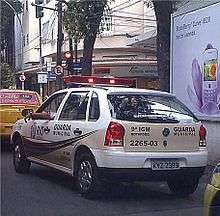Municipal Guards

Municipal Guards (Portuguese: Guardas Municipais, singular: Guarda Municipal), also called the Municipal Civil Guards (Guardas Civis Municipais, singular: Guarda Civil Municipal), are the security forces of municipalities (cities) of Brazil. Created in the time of the Empire of Brazil, the guardsmen are subordinated to the municipality mayors (prefeitos). Trained as a civilian uniformed agency, the city guards are responsible to police the municipal parks, properties, installations and the interior of municipal councils and city halls, according to the Brazilian Federal Constitution.
Their patrols are called rondas ("rounds") and there are 1,200 municipalities with Municipal Guards with more than 120,000 operatives according with the Brazilian Institute of Geography and Statistics. They are treated as police officers by the former president of the IPA (International Police Association) Brazilian section, Mr. George Henry Millard. The former Brazilian Minister of Justice and elected governor of the state of Rio Grande do Sul, Mr. Tarso Genro, asked for them to be given more jurisdiction for their operatives, and especially for their official recognition by Brazil as public safety workers.
Legal basis
Legally mandated missions IAW article 144, § 8º of the Federal Charter, when establishing activities, agencies and performance front to the Public Security and the safety of the people and the patrimony, stresses the responsibility of all but and mainly of the "State" (Union, States, Federal District and Cities), for the following:
- Protection of goods, services and facilities
- Organizing, directing and monitoring vehicle traffic in their territory
- Ensuring the right of the community to enjoy or use public goods, obeying the legal requirements
- Protecting the environment and historical, cultural and ecological heritage of the municipality
- Providing assistance for domestic and foreign tourists
Organization

The Municipal Guards or Municipal Civil Guards had been reorganized from the original document of the Federal Constitution (1988), giving authority to the cities to create Municipal Guards for the protection of their goods, services and installations, and who are able to make use of the Law.
Therefore, as a priority, they have to be able to act in these situations, but they also must be able to act in any other situation when crime is detected in the act, or threatens order or life, because in these cases, as the same Law, "any of the people can and the authorities & agents must act". Thus, even though it has divergences on the possibility the Municipal Guards' actions, the action is still supported by the Law.
These organizations diverge sufficiently between one and another city. There is a common error which cites them as paramilitary organizations, when in the truth, the only reference to this type of organization in the Brazilian laws says that these paramilitary organizations do not have to exist. Therefore, the Municipal Guards are not paramilitary, nor need to have similarity with military organizations, although normally to be initiated under the command of military pensioners of the BMP, which generally don't act in the interests of the Civil Guard, presenting some traces of these organizations. These traces, however, are being questioned for their integration and, gradually, reviewed, because the guards, as many even though are autodenominam, are civil, and not military, thus do not need, to have military vices, crazes to form its hierarchy and funcionability.
Civil Guard
The Municipal Civil Guard is a type of municipal civil police which can be created by specific laws of the chamber of the councilmen of the city as an instrument for public security in the city. Its components possess the same prerogatives and legal obligations as the municipality's employees. The GCM, as it is known, can still assist the other agencies of public security, such as: the Federal Police, Federal Road Police, Federal Railroad Police, Civil Police, (including the Superintendence of State Scientific Police Service) and the Military Police including the Corps of Military Firemen. By a "súmula" (Portuguese for "ruling", or stare decisis) of the Supreme Federal Tribunal, the scientific police are considered a branch of the Civil Police because of the principle of the indivisibility of criminal inquiry, fitting into the States of the Brazilian Federation that had conferred it autonomy, to subordinate it, again, to those institutions.
In São Paulo they receive the name Metropolitan Civil Guard. The use of marine blue uniforms for the Guards has been stipulated. In Rio de Janeiro it is only called only Municipal Guard and the uniform color is khakis. The Civil Guards are organizations of civil, not militarized corporations. Civil Guards of the cities with 20,000 inhabitants are authorized to use weapons transport. Firearms are only allowed with legal authorization. The transport is granted by the Federal government (Policy Statute of the Disarmament).
Up to 1965, the Civil Police of the most populous States of Brazil had in its administrative structure a full integration with the Civil Guard, but the police reforms in the beginning of the 20th century and designated them as preventive police, together, with the Military Police. These reforms were made more clear in the Coup D'état on March 30, 1964; which ended autonomy in the Brazilian federal subjects (the Union, the Federal District, The States of Union and the Autonomal Municipalities). The idea was to eliminate any resistance against the military regime. The Great Goal of the act was the elimination of the Republican State Civilian Guardas as well as the Republican Municipal Civilian Guardas.
The deriving government of the Military Coup of '64, establishing rigid control on the municipal and state uniformed police forces, extinguished the Civil Guards and many Municipal Guards too. They also succeeded in regulating the supervisory norms of the Army on the Military Police and nominated an official of the Army to command them in all the States.
Constititional Amendment
There is a PEC (Proposal of Constitutional Amendment, PEC nº 534/2002) which would change the Brazilian City/Municipal Guards constitutional status. If approved, the good use of police power will be regulated to every Municipal Guard Corps to serve and protect the Brazilian cities and citizens, transforming these corporations into law enforcement agencies de jure (The Brazilian people consider the Guardas policemen de facto, and the Brazilian Ministry of Justice are treating the guards as constables. However, the Brazilian State Police Forces don't agree with this ideal- In deed, all the municipal guard operatives accuses the State sheriffs and colonels of interfering in the municipality autonomy. In Portuguese, this act is called "ingerência").
The PEC was approved in the Brazilian Federal Senate and the Brazilian Federal House of Representatives Justice Commission (now it's waiting to be approved in the Brazilian Federal House of Representatives, in two voting sessions, with open vote). After that, the PEC will need to be approved by the President of Brazil.
See also
- Brazilian Federal Police
- Civil Police of Brazilian States
- Força Nacional de Segurança
- Military of Brazil
- Military Police of Brazilian States
References
External links
Portuguese only
- guardas municipais association site
- PEC law site
- PEC law site
- Guarda Municipal do Rio de Janeiro
- Ministério da Justiça
- STIVE - Site sobre Segurança Pública
- Efetivo das Polícias Civis (Secretaria Nacional de Segurança Pública)
- site do Sindicato dos Guardas Civis Metropolitanos da Cidade de São Paulo
English language links
| Wikimedia Commons has media related to Municipal Guards. |
| ||||||||||||||||||||||||||